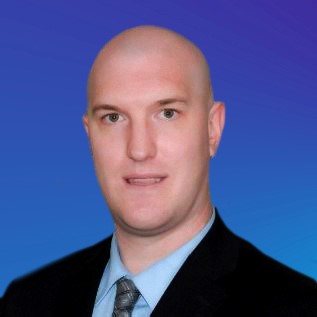Pharma in the field: Barrett's story
By Xcenda

Learn about driving force behind the growth and development of one of patient access' most important support roles

Field reimbursement and access teams support patient access to life-changing medicines, and one position that heavily influences team members' professional development is the team lead. While still highly focused on patient access, the team lead is dedicated to ensuring each field reimbursement and access specialist (FRAS) is successful through a mix of team and individual development activities, individual observations and coaching, and ongoing support.
Barrett, a team lead, exemplifies the dedication this job requires. He understands the importance of bringing teams together to act as one cohesive unit while helping individuals with diverse professional backgrounds and expertise demonstrate their passion for their work and reach their full potential.

A foundation in pharmaceutical-led care
Before joining Cencora six years ago, Barrett worked as a pharmacy technician in both inpatient and outpatient hospital pharmacies. He worked on a prior authorization team, obtaining both medical and pharmacy benefit prior authorizations and helping the billing department with claim denials
Barrett's background also includes experience on the provider side and demonstrates his commitment to helping people in need. During his schooling, Barrett did volunteer work inside of doctors' offices, helping to alleviate the needs of 2,000 families, addressing housing and income challenges and food insecurity, connecting patients with appropriate resources to support their access to medication.Communication and coordination
A day in the life of the team lead is similar to that of the field reimbursement and access specialist (FRAS), but with a focus on creating a cohesive, engaging, and impactful team environment, and being a strong partner to the manufacturer client he supports.
Barrett starts every work day by conducting one-on-one calls with his team members, either as part of scheduled weekly touchpoints or to tackle issues as they arise. During these conversations, he asks probing questions that help him identify how to support each individual's growth and success. While these conversations are highly work-oriented, Barrett believes it's also important to address the personal. “I think performance is directly related to how people are feeling in their personal life. Getting to know them and connect with them one-on-one helps me understand where they're coming from and allows me to better support each team member personally and professionally," he says.
Barrett's day then continues with client meetings that cover medication access and reimbursement issues and strategy. He reconnects with client leads to discuss new directions and help them build a better understanding of the team, their activities, and their impact. He closes his day out by organizing himself for the next day with pre-call planning, setting agendas for tomorrow's calls, and deciding how to infuse meaning and impact into his conversations with team members, clients, customers, and others he engages with.
A new kind of ridealong
Some of Barrett's days also include field observations, an exercise where he accompanies a FRAS to observe them, provide coaching feedback, highlight successes and best practices, and help identify opportunities for growth. While this would normally involve travel and trip planning, the COVID-19 pandemic has shifted his work into virtual field observations that leverage web conferencing technology.
Virtual field observations have emerged organically due to the COVID-19 pandemic, meaning that team leads are conducting them instead of onsite observations. Barrett coordinates with each team member to schedule a field observation, which includes pre-call planning and setting specific objectives for each client or customer engagement.
“I jump on a call when they're collaborating with a provider or sales partner, and I listen in to observe how they're working together and to provide insight and feedback on how they can keep that relationship strong and identify best practices, what they are doing well, and/or opportunities for improvement," he says.
An exercise in applying diverse skills
Barrett draws on his strong communication skills to infuse Cencora's guiding principles — be part of the solution and put people first, for example — into everything he and his team do.
“I've always felt that no matter how well you communicate, there's always an opportunity to improve. I always focus on using our guiding principles to structure the way I phrase things and add clarity to make sure I'm not only being understood but also that what I'm saying is meaningful and impactful to everybody," he adds.
Barrett also leads by example through ensuring he provides customer support when necessary. On occasion, Barrett engages with customers and addresses their specific needs when additional support is needed and/or a FRAS is not available..
Providing solutions in trying times
What's most important to Barrett is providing solutions, not just to his team, but to providers, manufacturers, and ultimately patients. In his current work with one manufacturer, he is watching the challenges that have emerged around a newly launched buy-and-bill migraine therapy. Patients show up every three months for treatment, and since the product was recently launched, they've seen a range of barriers.
At the same time, migraine therapy is a growing therapeutic class, and providers have lots of options. While Barrett believes that the product he represents stands out from the competition, he acknowledges that many of the challenges that have cropped up during the pandemic have made it more difficult to support access and affordability.
Since the product launched in the middle of a pandemic, Barrett and his team quickly shifted to providing virtual support to customers. Barrett and his team have been very strategic with how they engage with provider office staff to reduce provider office fatigue and to accommodate limited office staff availability by coordinating more closely with the hub and sales team.
Driven by patient access
Ultimately, Barrett is dedicated to improving patient access and outcomes. When you boil it down, his work is about providing education on medications for patients with conditions that might keep them from living their best lives. As a leader, he gets to make sure his team members have a wide network of options, strong enough to serve as many patients as possible. “Being a team lead, you take pride in what you and your team can accomplish by working together as a community to make a difference in peoples' lives," Barrett says. “Partnering with our clients in delivering seamless and coordinated services that have a positive impact on patient lives makes healthier lives and futures possible."




